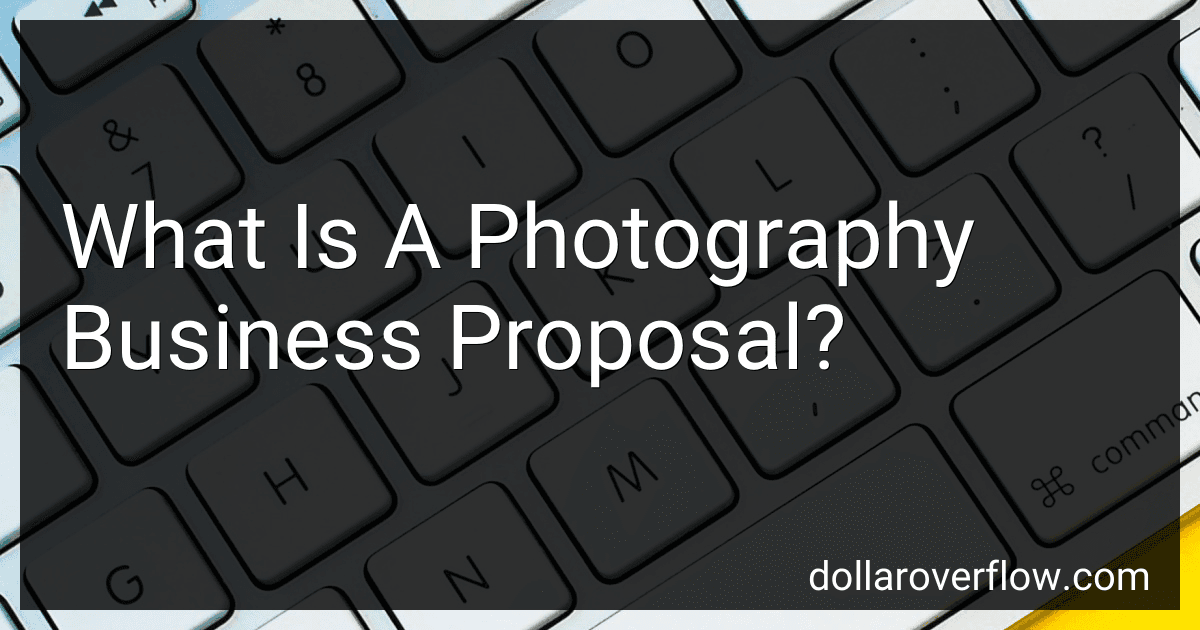A photography business proposal is a document that outlines a photographer's services, pricing, and contract terms in order to pitch their services to potential clients. The proposal provides detailed information about the photographer's background, experience, and sample work, as well as the specific services they offer such as portrait photography, event photography, or commercial photography. It also includes a breakdown of pricing for different packages or services, as well as any additional costs such as travel expenses or equipment rental fees. The proposal may also outline the terms of the agreement, including payment terms, cancellation policies, and copyright ownership. Overall, the photography business proposal is a professional document that helps photographers present their services in a clear and organized manner to potential clients.
How to write a photography business proposal?
To write a photography business proposal, follow these steps:
- Introduction: Begin the proposal with an introduction that provides a brief overview of your photography business, including your experience, expertise, and the services you offer.
- Client Needs: Clearly outline the needs and requirements of the client. What type of photography services are they looking for? What are their goals and expectations for the project?
- Proposed Solution: Offer a tailored solution that addresses the client's needs. Describe the specific photography services you will provide, including details such as the number of photo shoots, editing and retouching services, and delivery timeline.
- Pricing: Clearly outline your pricing structure for the photography services being offered. Include a breakdown of costs and any additional fees that may apply.
- Portfolio: Include a selection of your best photography work to showcase your skills and expertise. This can help the client visualize the quality of your work and determine if you are the right fit for their project.
- Terms and Conditions: Define the terms and conditions of the agreement, including payment terms, cancellation policy, and any other important details. Make sure to include any legal disclaimers to protect your business.
- Call to Action: Conclude the proposal with a strong call to action, encouraging the client to move forward with your photography services. Provide clear instructions on how to proceed, such as signing a contract or scheduling a consultation.
- Follow Up: Follow up with the client after submitting the proposal to answer any questions and address any concerns. This can help to build rapport and increase the chances of securing the project.
Remember to personalize the proposal to the specific needs of the client and showcase your unique selling points to stand out from the competition. Good luck!
What is the best way to follow up on a photography business proposal?
The best way to follow up on a photography business proposal is to send a polite and professional email or make a phone call to the client a few days after they have received the proposal. Thank them for considering your services and inquire if they have any further questions or would like to discuss any details. It is also helpful to offer to schedule a meeting or provide additional samples of your work to help them make a decision. Additionally, staying in touch with the client through regular email updates or phone calls can help keep your proposal top of mind and showcase your dedication to providing excellent service. Ultimately, the key is to communicate consistently, professionally, and in a way that shows your enthusiasm for working with the client.
What should be the main objective of a photography business proposal?
The main objective of a photography business proposal should be to showcase the photographer's skills, services, and value proposition to potential clients in order to win their business. The proposal should clearly outline the photographer's experience, style, and offerings, as well as how they can meet the specific needs and requirements of the client. The ultimate goal is to persuade the client to choose the photographer for their photography needs.
What should be the tone of a photography business proposal?
The tone of a photography business proposal should be professional, knowledgeable, and confident. It should convey a sense of expertise and creativity while also being clear and concise. The proposal should also be warm and inviting to potential clients, showcasing the photographer's passion for their craft and their commitment to providing high-quality services. It should be engaging and persuasive, convincing the client of the photographer's skills and abilities while also demonstrating a genuine interest in meeting the client's specific needs and goals.
How do you start a photography business proposal?
- Begin by introducing yourself and your photography business. Provide a brief overview of your photography background, experience, and the services you offer.
- Outline the purpose of the proposal. Explain what specifically you are proposing to potential clients, whether it is a photography project, event coverage, portrait sessions, etc.
- Provide details about the services you are offering. Describe the types of photography services you provide, your pricing packages, and any additional services such as photo editing, printing, or digital photo delivery.
- Highlight your unique selling points. Explain what sets your photography business apart from competitors, such as your style, approach, equipment, or experience.
- Include samples of your previous work. Provide a selection of your best photographs or a link to your online portfolio to showcase your skills and experiences.
- Outline the timeline and logistics of the proposed project. Include the proposed dates, locations, and any specific requirements or requests from the client.
- Detail the terms and conditions of the proposal. Include payment terms, cancellation policies, usage rights, and any other important considerations.
- Close the proposal with a strong call to action. Encourage the client to consider your proposal and provide contact information for further discussion or to book your services.
